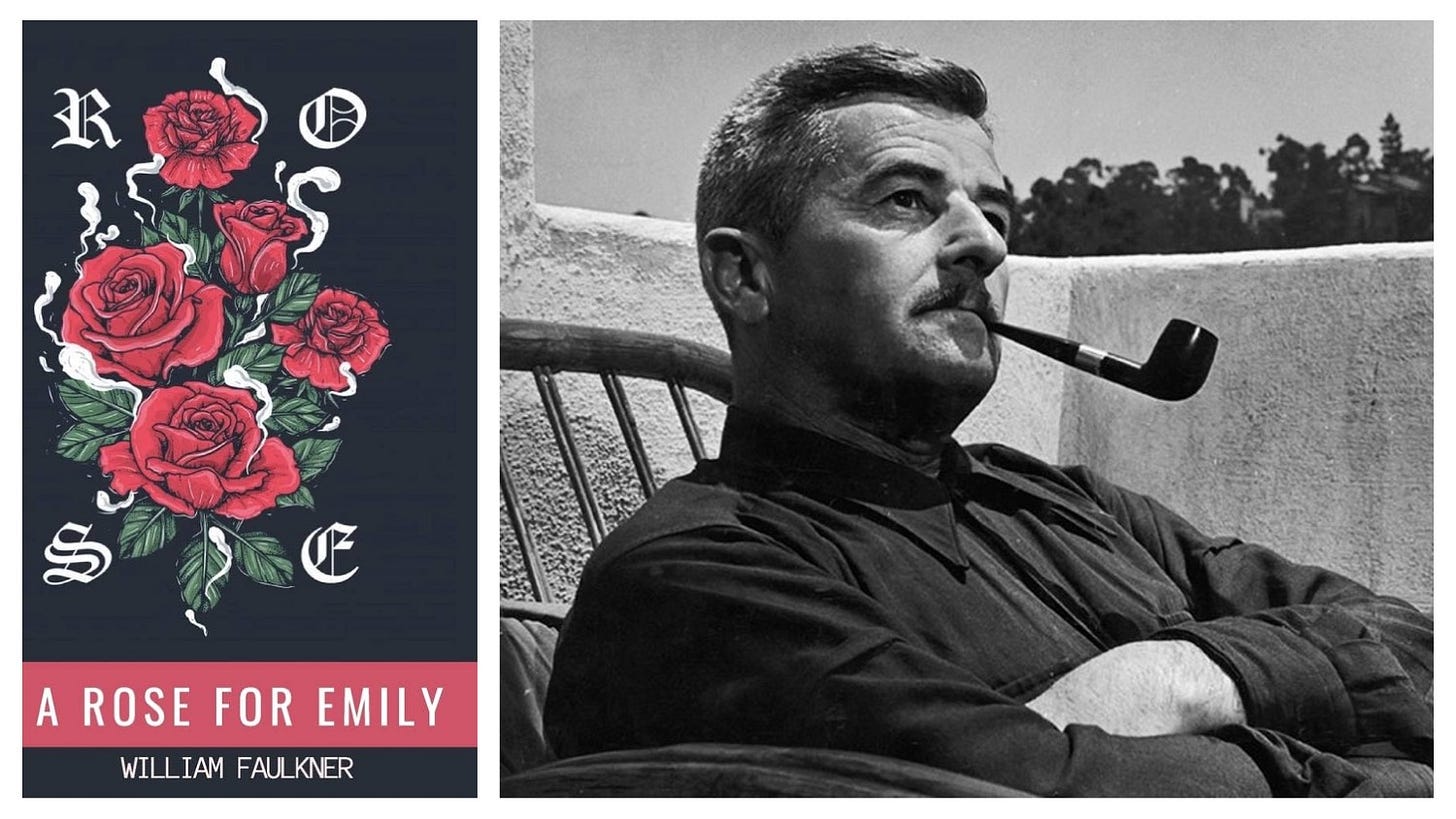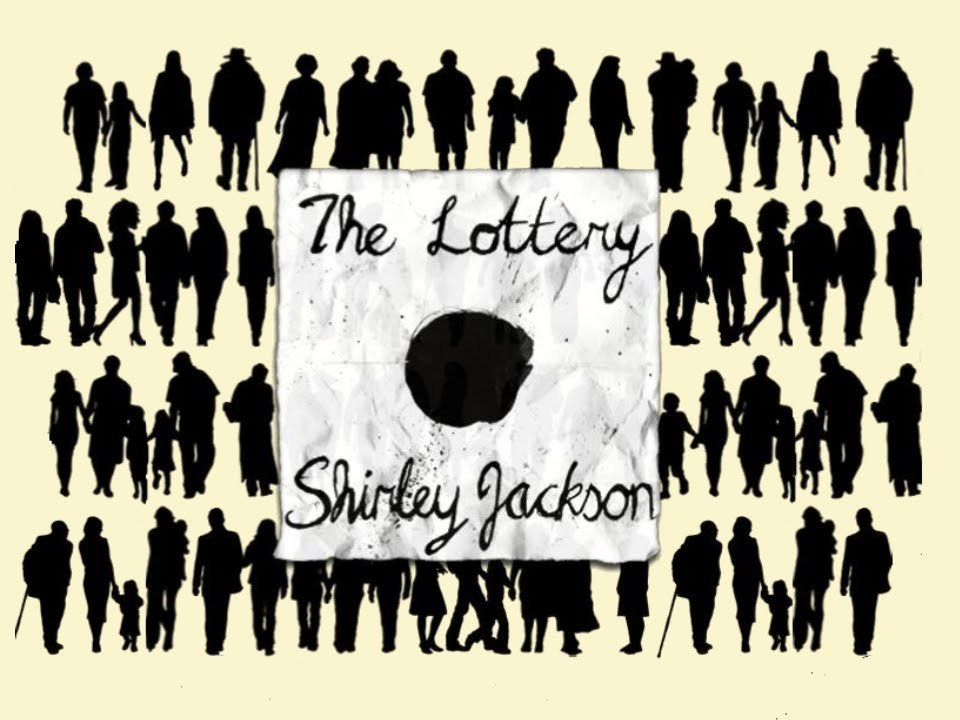Community in William Faulkner and Shirley Jackson
Comparing "A Rose to Emily" and "The Lottery"
After reading the Robert Penn Warren story last week, I dug out some more Southern fiction and reread William Faulkner’s classic, “A Rose for Emily,” which I first encountered in the 11th grade. I thought I’d had my fill of him, but like they say of the mafia, he pulled me back in.
This communal story is told in the first-person plural from the town’s perspective, and it pairs well with my next story in the Granta anthology, Shirley Jackson’s “The Lottery,” which I also first encountered in the 11th grade. Together, these stories reveal something about how America has changed over the past 75 years.
Before reading my analysis, you should definitely read (or reread) these stories. You only get the shock of reading them for the first time once, and I don’t want to be the one to spoil anything for you. “A Rose for Emily” is online here, and “The Lottery” is here.
“A Rose for Emily”
To start with the Faulkner, this story tells of Miss Emily Grierson, who recently died in the fictional small town of Jefferson, Mississippi. The “we” voice puts it into a mode of gossip. The townspeople are curious about her and what they might learn about her life now that she’s gone:
When Miss Emily Grierson died, our whole town went to her funeral: the men through a sort of respectful affection for a fallen monument, the women mostly out of curiosity to see the inside of her house, which no one save an old man-servant — a combined gardener and cook — had seen in at least ten years.
Through this voice, we learn that years ago her father kept suitors at arm’s length. When he died, she was reluctant to relinquish the body. Then a Yankee named Homer got a contract to pave the city’s sidewalks, and he began courting her when she was on the verge of spinsterhood. However, Homer apparently abandoned her decades ago, and she has kept herself shut in ever since.
Now that she has gone, the townspeople go into the house and find Homer’s decaying body in a bed. In the very last line of the story, they find one of Emily’s iron gray hairs in the bed alongside him.
There’s much to say about the craft of this story, from the structure to the follow of time to its point of view. Here, I’ll only point out a couple of “Faulknerian” sentences to offer a flavor of his style and what this story does to you. First, a sentence with a list:
Thus she passed from generation to generation — dear, inescapable, impervious, tranquil, and perverse.
Why write like this? Nearly every writing teacher will tell you to be economical and to lean on nouns and verbs. I can’t imagine any teacher saying it would be a good idea to offer up five clanging abstract adjectives, especially if you’re planning to open your list by calling a recently deceased old woman “dear” and end your list by calling her “perverse.”
It turns out “perverse” is accurate, but we don’t necessarily know that at this point in the story on the first read-through. It’s easy to let that word slide by on a reread, but it really is startling when you pause to think about it.
Here’s another sentence, a nice long rambling description of the funeral that morphs into philosophical rumination about how the elderly experience time:
They held the funeral on the second day, with the town coming to look at Miss Emily beneath a mass of bought flowers, with the crayon face of her father musing profoundly above the bier and the ladies sibilant and macabre; and the very old men — some in their brushed Confederate uniforms — on the porch and the lawn, talking of Miss Emily as if she had been a contemporary of theirs, believing that they had danced with her and courted her perhaps, confusing time with its mathematical progression, as the old do, to whom all the past is not a diminishing road but, instead, a huge meadow which no winter ever quite touches, divided from them now by the narrow bottle-neck of the most recent decade of years.
That’s worth reading a second time to parse. In his comment about the old men, he’s saying they tend to romanticize the distant past as this summery meadow while ignoring the 10+ years between then and now. Human perception is one of Faulkner’s great themes.
Beyond the prose, the heart of “A Rose for Emily” is its point of view, which you could read as (1) nosy and gossiping neighbors or (2) as a social structure in which people take care of their own. (“The day after [her father’s] death all the ladies prepared to call at the house and offer condolence and aid, as is our custom.”)
I’ll leave it to others to judge the merits of this structure, but it’s interesting to read it alongside “The Lottery.”
“The Lottery”
You only need to read this story once for it to make a deep impression. In an unnamed American village, townspeople gather for the annual summer lottery. Schoolchildren gather piles of rocks, and the village elder pulls out the traditional black box. We see Mrs. Hutchinson arrive late, and we learn Mr. Dunbar has a broken leg, so his wife will be filling in for him.
Once everyone has gathered, each family representative takes a ticket from box. Bill Hutchinson draws the paper with the mark on it, and Tessie Hutchinson protests that he didn’t have time to properly draw from the box. Rules being rules, however, all five the Hutchinsons draw from the box, and one by one they show a blank paper until only Tessie Hutchinson — who arrived late because she had to finish her dishes — has the paper with the mark on it.
As she protests again, we see the villagers gather their stones, and the story ends quickly while still making it clear what happens next: “‘It isn’t fair, it isn’t right,’ Mrs. Hutchinson screamed, and they were upon her.”
What do we make of this?
The story is obviously a parable about small-town traditions — or, as Jackson terms it, “civic activities.” She dedicates a good bit of narrative real estate to the box in particular:
The original paraphernalia for the lottery had been lost long ago, and the black box now resting on the stool had been put into use even before Old Man Warner, the oldest man in town, was born. Mr. Summers spoke frequently to the villagers about making a new box, but no one liked to upset even as much tradition as was represented by the black box. There was a story that the present box had been made with some pieces of the box that had preceded it, the one that had been constructed when the first people settled down to make a village here. Every year, after the lottery, Mr. Summers began talking again about a new box, but every year the subject was allowed to fade off without anything’s being done. The black box grew shabbier each year; by now it was no longer completely black but splintered badly along one side to show the original wood color, and in some places faded or stained.
A few pages later, we see the town elders discussing whether the lottery is still necessary:
“They do say,” Mr. Adams said to Old Man Warner, who stood next to him, “that over in the north village they’re talking of giving up the lottery.”
Old Man Warner snorted. “Pack of crazy fools,” he said. “Listening to the young folks, nothing’s good enough for them. Next thing you know, they’ll be wanting to go back to living in caves, nobody work any more, live that way for a while. Used to be a saying about ‘Lottery in June, corn be heavy soon.’ First thing you know, we’d all be eating stewed chickweed and acorns. There’s always been a lottery,” he added petulantly. “Bad enough to see young Joe Summers up there joking with everybody.”
Of course, we read this with horror: Does he really think that if you give up the annual stoning of a random townsperson, society will crumble and they’ll all return to “living in caves”? I presume Jackson’s point is to force us to reflect on the necessity of our own traditions and mores. What are we conforming to?
Did the Renegades Win?
“The Lottery” is an interesting contrast to “A Rose for Emily” because while Faulkner presents the townspeople as nosy gossips, Emily — the rebel who refuses to live according to convention — shocks the reader. The whole point is that what she’s been doing behind closed doors is unsettling. The town is the hero. (Arguably.)
Whereas Tessie Hutchinson, with her protests that it isn’t fair, is the rebel in “The Lottery,” and we’re meant to sympathize with her. The villages are barbaric, and the hero would be the person calling for an end to the annual stoning tradition.
Jackson’s story came out in 1948, at a time when a number of authors were critiquing small-town conformism and groupthink. Sinclair Lewis set the standard with Main Street (1920), which introduces the term “village virus” as someone who has settled into the small-minded life of a small town. Arthur Miller’s The Crucible (1953) is a parable about mob mentality during the Red Scare.
Reading “The Lottery” 75 years later, two things strike me.
First, the renegades won the battle over provincialism. In 2025, no one wants to be thought of as some kind of backwater hick. We’ve progressed beyond those “silly” traditions of the small-town rotary club, and we signal social class by glamorizing ethnic food.
In the process, however, we’ve given up the small-town social structures. Groupthink is alive and well, but we’re all atomized and anonymous. Today, rather than the crowd stoning the individual, you have individuals throwing Molotov cocktails into the crowd.




"Groupthink is alive and well, but we’re all atomized and anonymous." Great analysis as always